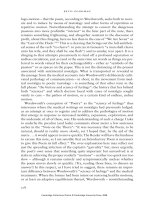The cambridge companion to british roman 23
Bạn đang xem bản rút gọn của tài liệu. Xem và tải ngay bản đầy đủ của tài liệu tại đây (38.47 KB, 1 trang )
I N T R O D U C T I O N : T H E C O M PA N I O N A B L E F O R M S O F
R O M A N T I C P O E T RY
JAMES CHANDLER AND MAUREEN N. M CLANE
Only that film, which fluttered on the grate,
Still flutters there, the sole unquiet thing.
Methinks, its motion in this hush of nature
Gives it dim sympathies with me who live,
Making it a companionable form . . .
Coleridge, “Frost at Midnight”1
It was, most immediately, the work of his own contemporaries that prompted
Percy Shelley to proclaim, at the close of his Defence of Poetry (1821), that
“Poets are the unacknowledged legislators of the world.” The authority of
those poets in the age we have come to call “Romantic,” Shelley explained,
derived not from their opinions, with which he often disagreed, but from
their capacity to tap into a certain spirit – what he called “the spirit of their
age.” Shelley figured this with a metaphor taken from recent developments
in the natural sciences: it is impossible to read these contemporaries, he
wrote, without being struck by “the electric life that burns in their words.”2
“Electricity,” for Shelley, is at once a modern scientific discovery and a theme
that hearkens back to the ancient myth of Prometheus, the thief of divine
fire. The prototypical writer of his age – the “Romantic poet” – thus became
on Shelley’s account a kind of modern Prometheus, a poet of the electric
life of words. This view would not go unchallenged. Indeed, even before
it was written down in the Defence of Poetry, Mary Shelley had published
Frankenstein: Or, The Modern Prometheus (1818), a fable of “electric life”
and monstrous ambition with more than casual application to her husband’s
grand schemes. In spite of such challenges, or because of them, a sense of
verbal electricity in Romantic poetry has persisted through generations of
readers and assured these writings a special place in British literature ever
since.
This special place suggests that a Companion to Romantic poetry must do
more than simply fill a gap between the Companions to eighteenth-century
and Victorian poetry. It is true that all three of these ages differ each from
the other in the historical particulars to which their poets had to respond.
The Augustan poets and their immediate successors might be said to have
responded to the new urban world of newspapers and coffee houses, to a new
polite commercial order in Britain in the wake of the founding of the Bank of
1
Cambridge Collections Online © Cambridge University Press, 2008









